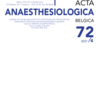Prinzmetal’s variant angina during laparoscopy: a case report of vasospasm in the context of cardiac arrest
case report; Prinzmetal’s angina; general anesthesia; laparoscopy; cardiac arrest
Published online: Mar 29 2022
Abstract
We report the case of a 43-year-old male patient who experienced cardiac arrest during two elective laparoscopies for cholecystectomy. The first procedure was prematurely interrupted after the return of spontaneous circulation (ROSC) while the other was continued under intravenous (IV) perfusion of nitrates (isosorbide dinitrate). At each time, after a cycle of cardiopulmonary resuscitation (CPR) and injection of atropine 0.5 mg, sinus rhythm was restored. Only 3-lead electrocardiogram (ECG) outlines were recorded, showing ST-elevation in lead II. During the first incident, a coronary angiography was performed showing a vasospasm of the left anterior descending (LAD) coronary artery, reversible upon intracoronary injection of nitrates. ECG during catheterization showed ST-elevation in the anterior coronary territory. Calcium-channel blockers (CCB) were prescribed, and oral nitrates were added after the second episode. Cardiovascular prevention consisted in smoking cessation, aspirin and statins. Reporting this case seems to be relevant due to its unusual presentation: Prinzmetal’s angina is usually described as morning chest pains, and it rarely concerns Caucasian men. Moreover, the vasospasm was associated with cardiac arrest and ECG changes suggestive of ST-elevation myocardial infarction (STEMI). The final diagnosis was myocardial infarction with non-obstructive coronary arteries (MINOCA) due to coronary vasospasm, a few minutes after insufflation of pneumoperitoneum. So far, few cases have been described during non-cardiac surgery, and even fewer during laparoscopy. Sharing our experience seems important to attract attention to cardiovascular events that can occur under general anesthesia, especially when clinical presentation is rare.
